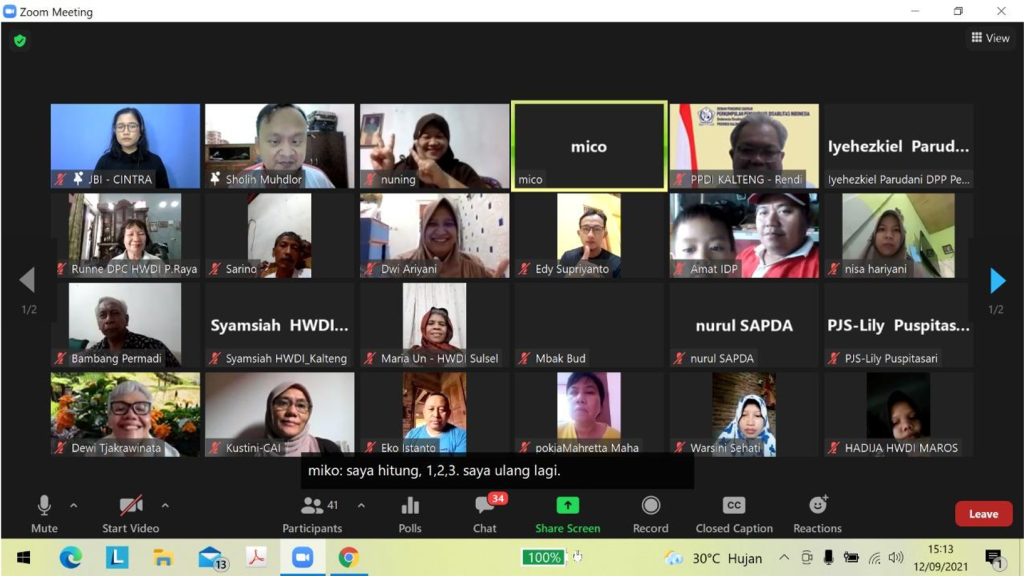
Hi! We are Kerry Thompson, Inclusion & Accessibility Development Manager, and Melanie Kawano-Chiu, Director of Learning & Evaluation, at the Disability Rights Fund/ Disability Rights Advocacy Fund (DRF/DRAF).
We’re data geeks – and so much more. I, Kerry, am a woman with the most marginalized disability in the world. And, I, Melanie, am a mom to a neuro-divergent, 5th-generation Asian-American girl. Nice to meet you, though you forgot to include us. We are two people who represent a larger community of persons with disabilities who you left behind in your learning and evaluation.
All too often, evaluations don’t ask about the experiences of persons with disabilities. In our careers as evaluators, we’ve seen dozens of evaluation surveys that don’t even offer respondents a chance to share whether they identify as someone with a disability. Moreover, many evaluation processes do not offer reasonable accommodations, such as sign language interpreters or captioning, that enable persons with disabilities to participate in evaluations. While accurate global data collection is still needed, the World Health Organization and World Bank estimate more than one billion people, or 15% of the global population, have a disability; 80% of persons with disabilities live in the developing world. It is critical to understand their experiences of and feedback on programs to capture the full evaluation picture. We’re here to say: “We’re here. We want to be counted. Professor Kimberlé Crenshaw’s term intersectionality applies to the multiple identities of persons with disabilities too. Evaluations need to include us.”
We recognize the sexual orientation, gender identity, gender expression, sexual characteristics (SOGIESC), indignity, age, and citizenship status (or lack thereof) of persons with disabilities create a complex layering of discrimination and marginalization. It’s essential that evaluations capture those layers. At DRF/DRAF, we’re committed to navigating those complexities in our learning efforts, and we hope you’ll follow our lead.
Hot Tip: Daily Learning with Persons with Disabilities Leads to Better Evaluations
Putting our principles into everyday practice has made the road to including persons with disabilities in our learning and evaluation less fraught.
As a start, our most important stakeholders – our “target communities” – are ingrained into the architecture of our learning. Persons with disabilities are leading our participatory grantmaking. We use rights-based approaches to data that help promote the full inclusion of persons with disabilities. In pre-pandemic years, we also closed feedback loops by turning full survey or evaluation reports into learning with grantees.
Furthermore, DRF/DRAF has developed learning exchanges in response to listening to our grantees’ requests and recognizing their expertise. These disability rights movement-led peer exchanges give organizations of persons with disabilities (OPDs) a way to share successes, challenges, and strategies with each other. The learning exchanges act as a mechanism for OPDs to engage in collaborative learning and collective action to support their rights advocacy efforts.
For example, in the Pacific, DRF/DRAF Pacific Program Officer Faaolo Utumapu-Utailesolo and Technical Assistance Director Christina Parasyn facilitated a series of Talanoa, a term shared by Tongans, Samoans, and Fijians that refers to a conversation, chat, and sharing of ideas that was introduced to Western methods by Konai Helu Thaman. Directed by grantees, the Talanoa focused on capitalizing upon regional developments in gender equality to advance the rights of women and girls with disabilities. In both the Pacific and Malawi, OPDs began the conversation about the intersectionalities and experiences of the LGBTQI+ and disability community.
In Indonesia, similar learning exchanges have focused on maintaining wellbeing during COVID-19 and advocacy efforts to increase access to vaccines for people with disabilities.

Because of our focus on day-to-day learning with grantees and persons with disabilities, we go into evaluations with better agreement on evaluation questions and who will make decisions with us. We have a wealth of monitoring data on not just the outputs and outcomes we’ve contributed to, but firsthand accounts of what happened. With this, we can provide external evaluation consultants with nuanced responses to both the if and how questions. Having such rich existing data means our evaluations can probe more deeply into strategic questions.
Rad Resources
If you’re looking to incorporate persons with disabilities into learning, consider appropriate application of the Washington Group Questions, which were developed to address the global data gap on persons with disabilities. The Washington Group on Disability notes that these questions reflect disability as the interaction between a person’s capabilities (limitation in functioning) and environmental barriers (physical, social, cultural, or legislative) that may limit their participation in society.
Do you have questions, concerns, kudos, or content to extend this aea365 contribution? Please add them in the comments section for this post on the aea365 webpage so that we may enrich our community of practice. Would you like to submit an aea365 Tip? Please send a note of interest to aea365@eval.org. aea365 is sponsored by the American Evaluation Association and provides a Tip-a-Day by and for evaluators.
